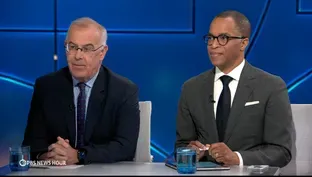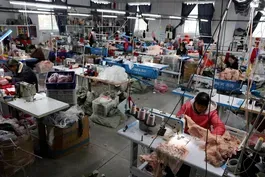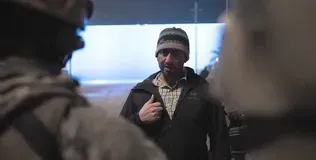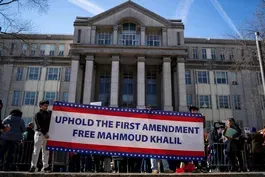
How Trump's trade war is impacting U.S. and global economies
Clip: 4/11/2025 | 7m 2sVideo has Closed Captions
How Trump's tariffs and trade war are impacting U.S. and global economies
For a closer look at how President Trump's tariffs are already impacting the U.S. and global economies, Amna Nawaz spoke with Mary Lovely, a senior fellow who studies tariffs at the nonpartisan Peterson Institute for International Economics.
Problems with Closed Captions? Closed Captioning Feedback
Problems with Closed Captions? Closed Captioning Feedback
Major corporate funding for the PBS News Hour is provided by BDO, BNSF, Consumer Cellular, American Cruise Lines, and Raymond James. Funding for the PBS NewsHour Weekend is provided by...

How Trump's trade war is impacting U.S. and global economies
Clip: 4/11/2025 | 7m 2sVideo has Closed Captions
For a closer look at how President Trump's tariffs are already impacting the U.S. and global economies, Amna Nawaz spoke with Mary Lovely, a senior fellow who studies tariffs at the nonpartisan Peterson Institute for International Economics.
Problems with Closed Captions? Closed Captioning Feedback
How to Watch PBS News Hour
PBS News Hour is available to stream on pbs.org and the free PBS App, available on iPhone, Apple TV, Android TV, Android smartphones, Amazon Fire TV, Amazon Fire Tablet, Roku, Samsung Smart TV, and Vizio.
Providing Support for PBS.org
Learn Moreabout PBS online sponsorshipAMNA NAWAZ: The wild week on Wall Street ended on a higher note today.
The Dow Jones industrial average climbed back above 40000, while the Nasdaq shot up by more than 2 percent.
The S&P 500 rallied as well by almost 2 percent.
For a closer look now at how these tariffs are already impacting the U.S. and global economies, we're joined tonight by Mary Lovely, a senior fellow who studies tariffs at the nonpartisan Peterson Institute for International Economics.
Mary, thanks for being here.
MARY LOVELY, Peterson Institute for International Economics: It's my pleasure.
AMNA NAWAZ: So let's just begin with the latest retaliation from Beijing, raising tariffs on U.S. imports to 125 percent.
What companies and industries here will feel that?
And what are the potential ripple effects of that?
MARY LOVELY: Well, obviously, it's going to be our export sectors and our exporters, agriculture, soybeans, the chicken industry.
We sell a lot of chicken to China.
Advanced machinery will feel it.
So all of these exports are now reaching prohibitive rates, which means that they will have to turn to somebody else, just as they did during the first trade war, but at these much, much higher rates.
The first time rates went up to maximum about 25 percent on some goods.
And now, as you heard today, we're over 100 percent.
AMNA NAWAZ: I mean, for like the semiconductor business, for example, we know the tariff hurt that industry as well, targets that industry.
China, my understanding is, imports some $10 billion in semiconductor chips from the U.S. every year.
These new tariffs are going to put pressure on companies like Intel and others with domestic manufacturing.
What can they do now?
Is there any way that they can still maintain access to the Chinese market or do they potentially shift manufacturing out of the U.S.?
MARY LOVELY: Well, many of them will -- some of them will shift manufacturing out of the U.S. What we're seeing is sort of a bifurcation or a splitting.
So you will see companies investing in the U.S. for the U.S., and they will be able to operate behind this tariff wall with high prices.
So they will be able to create things that might in the past not have been really economic to produce here because they have these high prices.
But for serving the rest of the world, they will go outside the U.S.
They won't have to pay higher taxes on their inputs, the things that they import to use in production.
And they won't face retaliatory tariffs from other trade partners.
AMNA NAWAZ: This escalation has continued step by step.
Do you see this moving towards negotiation between the U.S. and China any time soon?
MARY LOVELY: No, I don't see it moving toward negotiation.
I don't -- for the big economies.
So that includes China and the E.U.
Smaller countries, particularly those that are more dependent on the U.S. market, will make offers.
The president's press secretary has said the phone's been ringing.
That rings true to me for smaller countries, but bigger countries, those that can kind of stand up to this aggression, they will stand up.
They have to.
They have their own domestic political constituents who want them to stand up, and they won't make concessions.
AMNA NAWAZ: I want to ask you about something else I know we have been tracking.
We saw again today yields on U.S. government bonds, which is normally a very steady market, rising sharply.
We have also seen the continued weakening of the U.S. dollar.
How -- what does all of this tell you together, as one big picture, in terms of how the rest of the world is viewing the U.S. economy right now?
MARY LOVELY: I think it's very clear people are - - foreigners are taking their money out of the U.S.
The U.S. was always seen as the safest place, even when we had the global financial crisis about 15 years ago.
They actually put money into the U.S., because this is the safe haven.
That view of the U.S. as being the home of safe assets is eroding, and we're seeing them move out.
This is a big problem, because it's going to drive interest rates up at a time when, of course, the government is getting ready to increase the federal budget deficit and borrow a lot more.
That's going to put a lot more borrowing costs on to the American taxpayer.
AMNA NAWAZ: We're actually seeing governments in Europe, I was reading, put into place billions of euros, sort of as like a tariff shield, preparing some kind of financial support for their businesses.
What are they bracing for exactly?
MARY LOVELY: Well they're bracing for the loss of the access to the U.S. market.
And, for Europe, that's basically machinery and autos.
Autos will be hit very hard.
They're going to be hit under the 25 percent auto tariffs, which are separate from the so-called retaliatory tariffs or reciprocal tariffs that President Trump now has on pause.
Those companies are going to need support.
The same thing is going to be here.
We're hearing a lot of talk now about providing support for American farmers.
So, whatever tariff revenue that we have coming in is not going to be used toward deficit reduction.
It's going to have to be used to support American farmers in particular.
AMNA NAWAZ: Meanwhile, as you heard Lisa report there, consumer sentiment plunged in April.
That was, we should note, across age and income and education and political affiliation.
So, if prices go up because of the tariffs and consumers pull back, what could that do to the U.S. economy.
What could be ahead?
MARY LOVELY: Well, obviously, the probability of a recession has gone up.
For many forecasters, still, it's not what they necessarily think will happen, but economic activity will slow.
So people -- some people will lose their jobs.
Some people won't see raises.
They're going to see higher prices for things like cars and refrigerators.
So what do you do?
You decide to keep your powder dry.
You don't spend.
You have a gloomier output -- outlook for the future I mean, I think we're seeing that.
And it's a natural, normal response to what's happening on the global -- on the global stage.
AMNA NAWAZ: At the same time, we have heard the White House argue that this disruption is what they want, that the global trade paradigm has not been serving the U.S. Could all of this disruption lead to better deals, a better trade arrangement for the United States?
MARY LOVELY: Well, there are very legitimate complaints that the U.S. has.
However, when you think about it, does bullying - - bullying may get some concessions, but does it get lasting concessions?
Does it get the kind of cooperation -- there's lots of ways to put those barriers back in place that are hidden barriers, things that we're actually protesting now.
I think that people may have been somewhat disappointed that the U.S. hasn't made further progress on this.
I don't think this is going to work.
The other thing, of course, is that bringing manufacturing back to the U.S., we have to ask ourselves, what kind of manufacturing?
Do we want to be making lingerie and shoes, things we get from China?
I think, when Americans think about reindustrialization, they think about high-tech manufacturing and good jobs.
That cannot be done by Q4 of this year.
That kind of transition takes years.
AMNA NAWAZ: Mary Lovely of the Peterson Institute for International Economics, thank you so much for being here.
Great to talk to you.
MARY LOVELY: Thank you.
Brooks and Capehart on Trump’s tariffs and market reaction
Video has Closed Captions
Clip: 4/11/2025 | 11m 2s | Brooks and Capehart on Trump’s tariffs and reaction from the markets (11m 2s)
China raises tariffs on U.S. imports in trade war escalation
Video has Closed Captions
Clip: 4/11/2025 | 2m 58s | China raises tariffs on U.S. imports in latest escalation of trade war (2m 58s)
Former Navy SEAL on 'Warfare' and its depiction of combat
Video has Closed Captions
Clip: 4/11/2025 | 6m 9s | Former Navy SEAL on making the new film 'Warfare' and its authentic depiction of combat (6m 9s)
Judge rules Trump administration can deport Khalil
Video has Closed Captions
Clip: 4/11/2025 | 11m 39s | Immigration judge rules Trump administration can deport Columbia protestor Mahmoud Khalil (11m 39s)
News Wrap: Tourist helicopter crashes in Hudson River
Video has Closed Captions
Clip: 4/11/2025 | 5m 24s | News Wrap: Investigators search for cause of tourist helicopter crash in New York (5m 24s)
Patriotism takes hold in Taiwan amid threat from China
Video has Closed Captions
Clip: 4/11/2025 | 6m 29s | Patriotism takes hold in Taiwan in face of growing threats from China (6m 29s)
Providing Support for PBS.org
Learn Moreabout PBS online sponsorshipSupport for PBS provided by:
Major corporate funding for the PBS News Hour is provided by BDO, BNSF, Consumer Cellular, American Cruise Lines, and Raymond James. Funding for the PBS NewsHour Weekend is provided by...

















